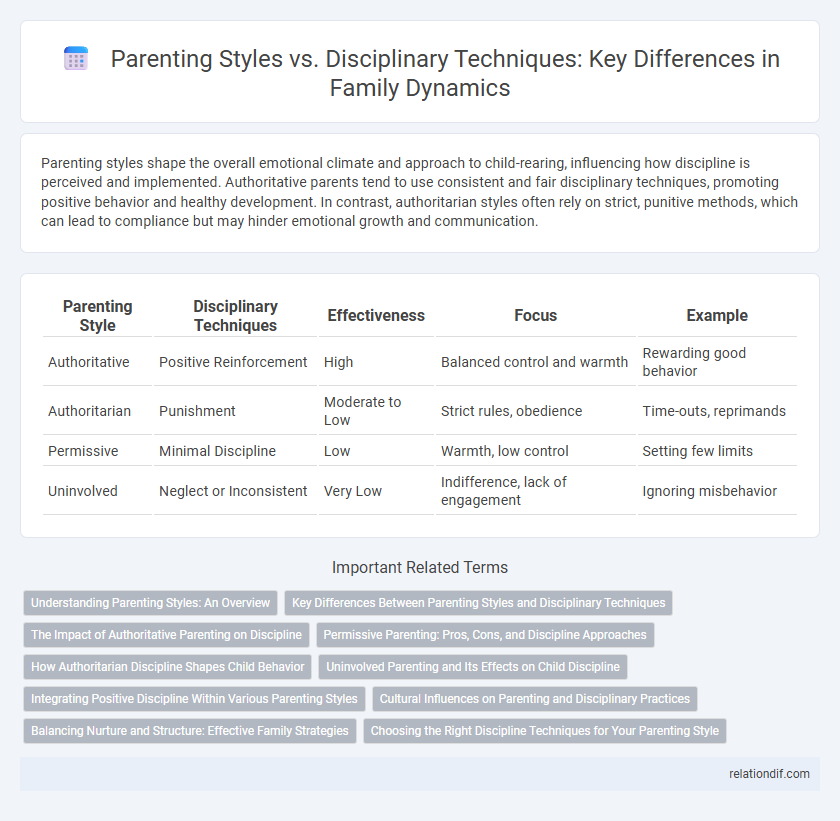Parenting styles shape the overall emotional climate and approach to child-rearing, influencing how discipline is perceived and implemented. Authoritative parents tend to use consistent and fair disciplinary techniques, promoting positive behavior and healthy development. In contrast, authoritarian styles often rely on strict, punitive methods, which can lead to compliance but may hinder emotional growth and communication.
Table of Comparison
| Parenting Style | Disciplinary Techniques | Effectiveness | Focus | Example |
|---|---|---|---|---|
| Authoritative | Positive Reinforcement | High | Balanced control and warmth | Rewarding good behavior |
| Authoritarian | Punishment | Moderate to Low | Strict rules, obedience | Time-outs, reprimands |
| Permissive | Minimal Discipline | Low | Warmth, low control | Setting few limits |
| Uninvolved | Neglect or Inconsistent | Very Low | Indifference, lack of engagement | Ignoring misbehavior |
Understanding Parenting Styles: An Overview
Parenting styles--authoritative, authoritarian, permissive, and uninvolved--shape children's behavior and development through varying degrees of responsiveness and demandingness. Authoritative parenting, characterized by high warmth and firm discipline, consistently leads to positive outcomes like improved social skills and academic success. Understanding these styles provides essential insights for selecting disciplinary techniques that balance guidance and structure, fostering healthy emotional growth.
Key Differences Between Parenting Styles and Disciplinary Techniques
Parenting styles refer to the overall approach and emotional climate parents create, such as authoritative, authoritarian, permissive, and uninvolved, which shape a child's development and behavior. Disciplinary techniques, including time-outs, positive reinforcement, and punishment, are specific methods used within these styles to manage behavior and enforce rules. The key difference lies in parenting styles providing the broader framework affecting long-term outcomes, while disciplinary techniques address immediate behavior management.
The Impact of Authoritative Parenting on Discipline
Authoritative parenting combines firm discipline with emotional support, promoting healthy child development and effective behavior regulation. This style encourages open communication and sets clear boundaries, leading to greater self-discipline and social competence in children. Research shows that authoritative parents' balanced approach reduces behavioral problems and enhances academic achievement.
Permissive Parenting: Pros, Cons, and Discipline Approaches
Permissive parenting, characterized by high responsiveness and low demands, fosters strong emotional bonds and encourages child creativity but often results in limited self-discipline and poor impulse control. Children raised with permissive discipline techniques may struggle with authority and exhibit behavioral issues due to inconsistent boundaries. Effective strategies within this style include setting clear, gentle limits and emphasizing positive reinforcement to balance freedom with structure.
How Authoritarian Discipline Shapes Child Behavior
Authoritarian discipline, characterized by strict rules and high demands without warmth, often leads to children exhibiting obedience coupled with lower self-esteem and social competence. Research indicates that this parenting style increases the likelihood of anxiety, aggression, and poor decision-making in children due to fear-driven compliance rather than understanding. The long-term effects include a tendency toward rebellion or dependence on external authority, impacting emotional regulation and interpersonal relationships.
Uninvolved Parenting and Its Effects on Child Discipline
Uninvolved parenting, characterized by low responsiveness and minimal communication, negatively impacts child discipline by fostering behavioral problems and emotional detachment. Children raised with this style often exhibit poor self-regulation, increased aggression, and academic difficulties due to inconsistent or absent guidance. Research links uninvolved parenting to higher risks of delinquency and social withdrawal in children, highlighting the need for engaged and structured disciplinary approaches.
Integrating Positive Discipline Within Various Parenting Styles
Integrating positive discipline within authoritative, permissive, and authoritarian parenting styles enhances child development by promoting respect, communication, and emotional regulation. Authoritative parents balance clear boundaries with empathy, making positive discipline most effective through consistent reinforcement and natural consequences. Incorporating positive discipline techniques such as active listening, problem-solving, and encouragement fosters healthy parent-child relationships regardless of the underlying parenting style.
Cultural Influences on Parenting and Disciplinary Practices
Parenting styles and disciplinary techniques are profoundly shaped by cultural values, norms, and traditions, which determine what behaviors are encouraged or discouraged in children. For instance, collectivist cultures often emphasize obedience and respect through authoritative disciplinary practices, while individualistic cultures may prioritize independence with more permissive approaches. Understanding these cultural influences is crucial for effective parenting, as it aligns disciplinary methods with familial beliefs and societal expectations.
Balancing Nurture and Structure: Effective Family Strategies
Effective family strategies balance nurturing warmth with consistent disciplinary techniques to promote healthy child development. Parenting styles like authoritative parenting combine empathy and clear boundaries, fostering both emotional security and self-discipline in children. Integrating positive reinforcement with structured routines optimizes behavioral outcomes and strengthens parent-child relationships.
Choosing the Right Discipline Techniques for Your Parenting Style
Selecting discipline techniques aligned with your parenting style enhances child development and emotional well-being. Authoritative parents benefit from consistent, positive reinforcement methods that promote autonomy, while authoritarian parents may lean toward structured consequences to enforce rules. Understanding the match between parenting style and disciplinary approach ensures effective behavior management and fosters a supportive family environment.
parenting styles vs disciplinary techniques Infographic

 relationdif.com
relationdif.com